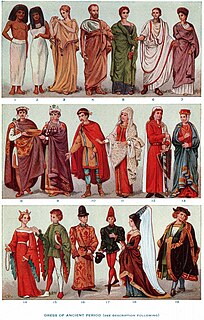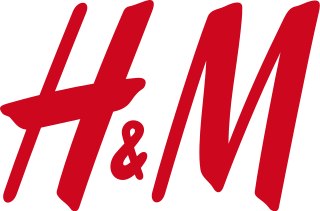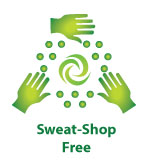Related Research Articles

Clothing are items worn on the body. Typically, clothing is made of fabrics or textiles, but over time it has included garments made from animal skin and other thin sheets of materials and natural products found in the environment, put together. The wearing of clothing is mostly restricted to human beings and is a feature of all human societies. The amount and type of clothing worn depends on gender, body type, social factors, and geographic considerations. Garments cover the body, footwear covers the feet, gloves cover the hands, while hats and headgear cover the head. Eyewear and jewelry are not generally considered items of clothing, but play an important role in fashion and clothing as costume.

A sweatshop or sweat factory is a crowded workplace with very poor, socially unacceptable or illegal working conditions. Some illegal working conditions include poor ventilation, little to no breaks, inadequate work space, insufficient lighting, or uncomfortably/dangerously high or low temperatures. The work may be difficult, tiresome, dangerous, climatically challenging or underpaid. Workers in sweatshops may work long hours with unfair wages, regardless of laws mandating overtime pay or a minimum wage; child labor laws may also be violated. Women make up 85 to 90% of sweatshop workers and may be forced by employers to take birth control and routine pregnancy tests to avoid supporting maternity leave or providing health benefits. The Fair Labor Association's "2006 Annual Public Report" inspected factories for FLA compliance in 18 countries including Bangladesh, El Salvador, Colombia, Guatemala, Malaysia, Thailand, Tunisia, Turkey, China, India, Vietnam, Honduras, Indonesia, Brazil, Mexico, and the US. The U.S. Department of Labor's "2015 Findings on the Worst Forms of Child Labor" found that "18 countries did not meet the International Labour Organization's recommendation for an adequate number of inspectors."

H & M Hennes & Mauritz AB or H&M Group is a multinational clothing company based in Sweden. Its focus is fast-fashion clothing for men, women, teenagers, and children. As of 2021, H&M Group operates in 75 geographical markets with 4,702 stores under the various company brands, with 107,375 full-time equivalent positions.
No Sweat is a broad-based not-for-profit organisation with HQ in London's Kings Cross, England, which fights for the well-being and protection of sweatshop labourers, not only in developing countries but also in Britain.

War on Want is an anti-poverty charity based in London. War on Want works to challenge the root causes of poverty, inequality and injustice through partnership with social movements in the global South and campaigns in the UK. War on Want's slogan is "poverty is political" and its stated focus is on the root causes of poverty rather than its effects.

Guess is an American clothing brand and retailer, producing clothing for men and women. Guess licenses its brand on other fashion accessories, such as watches, jewelry, perfumes, bags and shoes.
Primark Stores Limited is an Irish multinational fast fashion retailer with headquarters in Dublin, Ireland. It is a subsidiary of Associated British Foods and has stores across Europe and in the United States. The Penneys brand is not used outside of Ireland because it is owned elsewhere by American retailer J. C. Penney.
Matalan is a British fashion and homeware retailer based in Knowsley, Merseyside. It was established by John Hargreaves in 1985, and is still owned by the Hargreaves family. As of 2020, the company employed over 13,000, and had 230 stores in the United Kingdom, together with franchise stores in the Middle East.
The Just Group owns and operates a total of seven retail brands: Just Jeans, Jay Jays, Jacqui E, Portmans, Dotti, Peter Alexander Sleepwear, and Smiggle. The group has over 1,000 stores throughout Australia, New Zealand, Singapore and the United Kingdom.

The International Labor Rights Forum (ILRF) is a nonprofit advocacy organization headquartered in Washington, D.C., U.S., that describes itself as "an advocate for and with the working poor around the world." ILRF, formerly the "International Labor Rights Education & Research Fund", was founded in 1986, and the organization's mission statement reads: "ILRF believes that all workers have the right to a safe working environment where they are treated with dignity and respect, and where they can organize freely to defend and promote their rights and interests. ILRF works to develop practical and effective tools to assist workers in winning enforcement of protections for their basic rights, and hold labor rights violators accountable."
Fast fashion is a term used to describe the clothing industry's business model of replicating recent catwalk trends and high-fashion designs, mass-producing them at a low cost, and bringing them to retail stores quickly, while demand is at its highest. The term fast fashion is also used generically to describe the products of the fast fashion business model.
"Fashion victim" is a term claimed to have been coined by Oscar de la Renta that is used to identify a person who is unable to identify commonly recognized boundaries of style.
The Clean Clothes Campaign (CCC) is the garment industry's largest alliance of labour unions and non-governmental organizations. The civil society campaign focuses on the improvement of working conditions in the garment and sportswear industries. Formed in the Netherlands in 1989, the CCC has campaigns in 15 European countries: Austria, Belgium, Denmark, Finland, France, Germany, Italy, Ireland, Netherlands, Norway, Poland, Spain, Sweden, Switzerland and the United Kingdom. The CCC works with a partner network of more than 250 organizations around the world.
Anti-sweatshop movement refers to campaigns to improve the conditions of workers in sweatshops, i.e. manufacturing places characterized by low wages, poor working conditions and often child labor. It started in the 19th century in industrialized countries such as the United States, Australia, New Zealand and the United Kingdom to improve the conditions of workers in those countries.
Dan McDougall is an international journalist. He is the current Africa Correspondent for The Sunday Times of London. He has reported from over 126 countries and war zones including Afghanistan, Somalia, Pakistani Kashmir, Northern Yemen, The Sudan, The Eastern Democratic Republic of Congo, Burma, Rwanda, Bosnia, China, Hezbollah-controlled Lebanon and the Palestinian Territories.

Sweatshop-free or sweat free is a term first used by American Apparel, a famous American clothing brand, which means coercion-free, fair-compensation for the garment workers who manufacture their products. The aim of sweatshop-free wish to ensure that all employees are treated fairly and products are made in good working conditions. Sweatshop-free standards include the right to collective bargaining, non-poverty wages, safe workplaces, back wages, and non-harassment. It has been heavily featured in American Apparel’s advertisements and become a common term in the garment industry.
Clothing industry or garment industry summarizes the types of trade and industry along the production and value chain of clothing and garments, starting with the textile industry, embellishment using embroidery, via the fashion industry to apparel retailers up to trade with second-hand clothes and textile recycling. The producing sectors build upon a wealth of clothing technology some of which, like the loom, the cotton gin, and the sewing machine heralded industrialization not only of the previous textile manufacturing practices. Clothing industries are also known as allied industries, fashion industries, garment industries, or soft good industries.
SACOM, or Students and Scholars Against Corporate Misbehaviour is a non-government organization founded in 2005 by a group of students and scholars from tertiary institutions in Hong Kong. SACOM monitors and publicizes the misconducts of multinational corporations through first-hand investigations in supplier factories.
Pep&Co is a British discount fashion retail chain, owned by the South African company Pepkor and based in Watford, England.
Boohoo Group plc is a British online fashion retailer, aimed at 16–30 year olds. The business was founded in 2006, and had sales in 2019 of £856.9 million. It specialises in own brand fashion clothing, with over 36,000 products. Growing rapidly, the company has acquired the brands and online presence of several defunct high street retailers, and also seen controversy over working conditions at some of its suppliers.
References
- ↑ "Campaign of the week: Labour behind the label". The Guardian . 13 December 2005. Retrieved 9 September 2014.
- ↑ "Cheap garments carry a high cost". The Independent . 30 March 2014. Retrieved 8 September 2014.
- 1 2 3 Shepard, Anna (24 June 2008). "Engaging the high street is the way to ethical clothes". The Daily Telegraph . Archived from the original on 5 July 2011. Retrieved 8 September 2014.
- ↑ Siegle, Lucy (7 April 2012). "Is H&M the new home of ethical fashion?". The Observer . Retrieved 8 September 2014.
- 1 2 Taylor, Andrew (11 June 2007). "'Sweatshop' alert for Olympics". Financial Times . Retrieved 9 September 2014.
Research by the Playfair Alliance – supported by the Trades Union Congress and the British-based Labour Behind the Label [...] Maggie Burns, who chairs Labour Behind the Label – the British arm of the international Clean Clothes campaign,
- ↑ McPherson, Poppy (16 September 2013). "Cambodian textile workers who supply UK clothing stores 'starving' and suffering 'mass faintings'". The Independent . Retrieved 8 September 2014.
- ↑ "The real cost of fashion: a special report". The Independent . 16 November 2007. Retrieved 8 September 2014.
- ↑ Collins, Paul (17 January 2013). "Khorshed Alam obituary". The Observer . Retrieved 9 September 2014.
In 2006, the UK charity War on Want commissioned Khorshed Alam, who has died, aged 46, of septicaemia, to undertake research in Bangladesh on workers producing clothes for Primark, Tesco and Asda. His report on their poverty wages and sweatshop conditions brought huge public attention.
- ↑ "Sweatshops paying workers half what they need to live". The Independent . 14 September 2007. Archived from the original on 9 December 2009. Retrieved 8 September 2014.
- ↑ "'Living wage' identified for Asia". BBC News. 7 October 2009. Retrieved 8 September 2014.
- ↑ Chamberlain, Gethin (12 December 2010). "Britain's high street chains are named by sweatshop probe". The Observer . Retrieved 9 September 2014.
- ↑ Butler, Sarah (20 March 2011). "Top chains are urged to ban sandblasted jeans". The Daily Telegraph . Retrieved 8 September 2014.
- ↑ Lee, Matilda (25 May 2011). "Take Action to ban 'killer jeans'". The Ecologist . Retrieved 9 September 2014.
- ↑ "About Us". Labour Behind the Label. Archived from the original on 8 September 2014. Retrieved 9 September 2014.